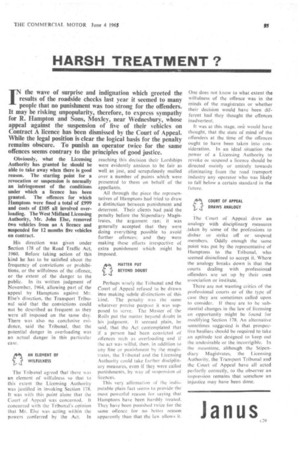HARSH TREATMENT?
Page 57

If you've noticed an error in this article please click here to report it so we can fix it.
rthe wave of surprise and indignation which greeted the esults of the roadside checks last year, it seemed to many
people that no punishment was too strong for the offenders. It may be risking unpopularity, therefore, to express sympathy for R. Hampton and Sons, Moxley, near Wednesbury, whose appeal against the suspension of five of their vehicles on Contract A licence has been dismissed by the Court of Appeal. While the legal position is clear the logical basis for the penalty remains obscure. To punish an operator twice for the same offences seems contrary to the principles of good justice.
Obviously, what the Licensing Authority has granted he should be able to take away when there is good reason. The starting point for a revocation or suspension is normally an infringement of the conditions under which a licence has been granted. The offences for which Hamptons were fined a total of £999 and costs of £105 all involved overloading. The West Midland Licensing Authority, Mr. John Else, removed two vehicles from an A licence and suspended for 12 months five vehicles on contract.
His direction was given under Section 178 of the Road Traffic Act, 1960. Before taking action of this kind he has to be satisfied about the frequency of convictions or prohibitions, or the wilfulness of the offence, or the extent of the danger to the public. In its written judgment of November, 1964, allowing part of the appeal by Hamptons against Mr. Else's direction, the Transport Tribunal said that the convictions could not be described as frequent as they were all imposed on the same day. There was also no conclusive evidence, said the Tribunal, that the potential danger in overloading was an actual danger in this particular' case.
AN ELEMENT OF WILFULNESS
The Tribunal agreed that there was an element of wilfulness so that toL this extent the Licensing Authority was justified in invoking Section 178. It was with this point alone that the Court ofAppeal Was concerned. It concurred with the Tribunal's opinion that -Mr. Else was acting within the powers cOnferred by the Act. In reaching this decision their Lordships were evidently anxious to be fair as well as just, and scrupulously mulled over a number of points which were presented to them on behalf of the appellants.
All through the piece the representatives of Hamptons had tried to draw a distinction between punishment and deterrent. Their clients had paid the penalty before the Stipendiary Magistrates, the argument ran; it was generally accepted that they were doing everything possible to avoid further offences; and they were making these efforts irrespective of extra punishment which might be imposed.
MATTER PUT BEYOND DOUBT
Perhaps wisely the Tribunal and the Court of Appeal refused to be drawn into making subtle distinctions of this kind. The penalty was the same whatever precise purpose it was supposed to serve. The Master of the Rolls put the matter beyond doubt in his judgment. it seemed plain, he said, that the Act contemplated that if a person had been convicted of offences such as overloading and if the act was wilful, then, in addition to any fine or punishment by the magistrates, the Tribunal and the Licensing Authority could take further disciplinary measures, even if they were called punishments, by way of suspension of licences.
This very affirmation of the indisputable plain •fact seems to provide the most powerful reason for saying that Hamptons have been harshly treated. They have been punished twice for the same •offence for no better reason anparenily than that the law allows it.
One does not know to what extent the wilfulness of the offence was in the minds of the magistrates or whether their decision would have been different had they thought the offences inadvertent.
It was at this stage, one would have thought, that the state of mind of the offenders at the time of the offences ought to have been taken into consideration, In an ideal situation the power of a Licensing Authority to revoke or suspend a licence should be directed mainly or entirely towards eliminating from the road transport industry any operator who was likely to fall below a certain standard in the future.
COURT OF APPEAL DRAWS ANALOGY
The Court of Appeal drew an analogy with disciplinary measures ...taken by some of the Professions to disbar or strike off or suspend members. • Oddly enough the same point was put by the representative of Hamptons to the Tribunal, who seemed disinclined to accept it. Where the analogy breaks down is that • the courts dealing with professional offenders are set up by their own association or institute.
There are not wanting critics of the professional courts or of the type of case they are sometimes called upon to consider. If there are to he substantial changes in the law of licensing an opportunity might be found for modifying Section 178. An alternative sometimes suggested is that prospective hauliers should be required to take an aptitude test designed to keep out the undesirable or the incorrigible. In the meantime, although the Stipendiary Magistrates, the Licensing Authority, the Transport Tribunal and the Court of Appeal have all acted perfectly correctly, to the observer an impression remains that somehow an injusticemay have been done.
























































































































